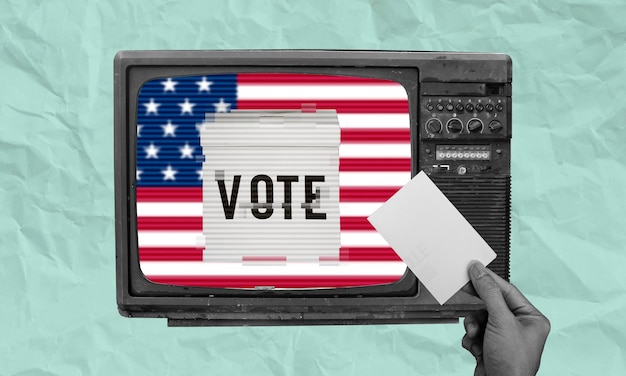Register to Vote Online in All 50 States Before 2025 Deadlines

Registering to vote online is possible in most states, making it easier than ever to participate in elections; this guide provides comprehensive information on how to register to vote online in all 50 states, including deadlines, eligibility requirements, and helpful resources to ensure you’re ready for the 2025 elections.
Registering to vote online in all 50 states before the 2025 deadlines is a straightforward process that ensures your voice is heard in upcoming elections. By understanding the specific requirements and deadlines for your state, you can easily complete your voter registration from the comfort of your home.
Why Register to Vote Online?
Registering to vote is a fundamental right and responsibility in a democratic society. Online registration offers a convenient and accessible way for citizens to participate in the electoral process. By registering online, you can avoid the hassle of mailing in forms and ensure your registration is processed quickly and efficiently.
The rise of online voter registration has significantly increased voter turnout, especially among younger demographics. This digital approach streamlines the process, making it easier for individuals to exercise their right to vote and contribute to shaping the future of their communities and the nation.

Benefits of Online Voter Registration
Online voter registration offers several advantages over traditional paper-based methods. These benefits include increased accessibility, reduced errors, and faster processing times. Understanding these advantages can help you appreciate the importance of registering online.
- Convenience: Register from anywhere with internet access, eliminating the need to visit a physical location.
- Efficiency: Online forms are typically processed faster than mailed forms, ensuring timely registration.
- Accuracy: Digital forms reduce the risk of errors associated with manual data entry.
- Accessibility: Online registration is available 24/7, making it accessible to individuals with varying schedules.
In conclusion, registering to vote online provides a seamless and efficient way to participate in the democratic process. Its convenience, accuracy, and accessibility make it a preferred method for modern voters, ensuring broader participation in elections.
Eligibility Requirements for Online Voter Registration
Before you can register to vote online, you must meet certain eligibility requirements. These requirements typically include being a U.S. citizen, meeting the state’s residency requirements, and being at least 18 years old by the date of the election. Understanding these requirements will help ensure your registration is valid.
Additionally, some states may have specific rules regarding felony convictions and mental competency. It’s crucial to review your state’s specific requirements to confirm your eligibility and avoid any potential issues with your registration.
Common Eligibility Criteria
Most states share similar eligibility criteria for voter registration, including citizenship, residency, and age. However, it’s essential to confirm the specific requirements in your state to ensure compliance.
- U.S. Citizenship: You must be a citizen of the United States to register to vote.
- Residency: You must reside in the state where you are registering to vote. Residency requirements vary by state.
- Age: You must be at least 18 years old on or before election day.
- Felony Convictions: Many states have rules regarding voter eligibility for individuals with felony convictions. These rules vary significantly by state.
In summary, verifying your eligibility is a critical first step in the online voter registration process. By understanding and meeting the requirements, you can ensure that your registration is accepted and that you can exercise your right to vote in upcoming elections.
How to Find Your State’s Online Voter Registration Website
Each state has its own official website for online voter registration. These websites typically require you to provide your driver’s license or state ID number, as well as your Social Security number or other identifying information. Finding the correct website is the first step in the registration process.
You can usually find your state’s online voter registration website by searching online for “[Your State] online voter registration.” Alternatively, you can visit the U.S. Election Assistance Commission website for a comprehensive list of state election offices.

Steps to Locate the Correct Website
Finding the official online voter registration website for your state is a crucial step. Here are some practical tips to help you locate the correct website and avoid fraudulent sites.
- Search Online: Use search engines like Google, Bing, or DuckDuckGo to search for “[Your State] online voter registration.”
- Check Official Sources: Visit the U.S. Election Assistance Commission website for a directory of state election offices.
- Look for .gov Domains: Ensure the website you are visiting has a “.gov” domain, indicating it is an official government site.
- Verify Information: Double-check the website’s contact information and look for official seals or logos to ensure its legitimacy.
In conclusion, finding the correct online voter registration website is essential to ensure your information is submitted securely and accurately. By using reliable search methods and verifying the website’s authenticity, you can confidently proceed with your voter registration.
Information You’ll Need to Register Online
When registering to vote online, you’ll typically need to provide certain personal information. This includes your name, address, date of birth, and contact information. You may also need to provide your driver’s license or state ID number, as well as the last four digits of your Social Security number.
Having this information readily available before you start the registration process can streamline the process and prevent delays. Be sure to double-check all information for accuracy before submitting your application.
Required Information Checklist
To make the online voter registration process as smooth as possible, prepare the necessary information in advance. Here’s a checklist of commonly required details:
- Full Legal Name: Your first, middle, and last name as it appears on official documents.
- Residential Address: Your current home address, including street number, apartment number (if applicable), city, state, and ZIP code.
- Date of Birth: Your birth date, typically in MM/DD/YYYY format.
- Driver’s License or State ID Number: The identification number from your driver’s license or state-issued ID card.
- Social Security Number (Partial): The last four digits of your Social Security number.
In summary, preparing the required information in advance can save you time and reduce the likelihood of errors during the online voter registration process. Double-checking the accuracy of your information ensures that your application is processed without delays.
Deadlines for Online Voter Registration in 2025
Each state has its own deadlines for voter registration, which typically fall 30 days before an election. These deadlines are crucial to ensure that your registration is processed in time for you to vote. Missing the deadline means you won’t be eligible to vote in the upcoming election.
Check your state’s election website for specific deadlines for primary, general, and special elections in 2025. Mark these dates on your calendar and plan to register well in advance to avoid any last-minute issues.
Key Dates to Remember
Staying informed about voter registration deadlines is crucial for participating in elections. Here are some key dates to keep in mind:
- Primary Election Deadlines: These deadlines typically fall 30 days before the primary election date.
- General Election Deadlines: The general election registration deadline is usually 30 days before the general election date.
- Special Election Deadlines: Special elections may have different deadlines, so check your state’s election website for details.
In conclusion, being aware of and adhering to the voter registration deadlines is essential. By planning ahead and registering well in advance, you can ensure that you are eligible to vote in all upcoming elections and have your voice heard.
What Happens After You Register Online?
After you submit your online voter registration application, your state’s election officials will review the information and verify your eligibility. If your application is approved, you will typically receive a voter registration card in the mail. This card confirms your registration and provides information about your polling place.
If your application is rejected, you will receive a notification explaining the reason for the rejection. Common reasons include missing information, inaccurate data, or failure to meet the eligibility requirements. You can usually correct these issues and resubmit your application.
Post-Registration Steps
Understanding what to expect after you register online can help you ensure that your registration is successful and that you are prepared to vote. Here’s what typically happens after you submit your application:
- Application Review: Your state’s election officials will review your application for completeness and accuracy.
- Verification Process: Officials will verify your eligibility based on the information provided.
- Voter Registration Card: If approved, you will receive a voter registration card in the mail with your polling place information.
- Notification of Rejection: If rejected, you will receive a notification explaining the reason and instructions on how to correct the issue.
In summary, knowing the steps that follow your online voter registration can help you stay informed and address any potential issues promptly. By understanding the process, you can ensure that your registration is successful and that you are ready to vote in upcoming elections.
| Key Point | Brief Description |
|---|---|
| ✍️ Eligibility | Must be a US citizen, meet residency rules, and be 18 by election day. |
| 🌐 State Website | Find your state’s official online voter registration website for secure sign-up. |
| 📅 Deadlines | Register before the deadlines, usually 30 days before any election. |
| ✅ What’s Next | Expect a voter card in the mail; if rejected, you’ll receive an explanation. |
Frequently Asked Questions
▼
To register online, you generally need to be a U.S. citizen, meet your state’s residency requirements, and be at least 18 years old by election day. Some states may have specific rules regarding felony convictions or mental competency.
▼
You can find your state’s website by searching online for “[Your State] online voter registration” or by visiting the U.S. Election Assistance Commission website, which provides a directory of state election offices.
▼
You typically need to provide your full name, residential address, date of birth, driver’s license or state ID number, and the last four digits of your Social Security number. Having this information ready streamlines the process.
▼
Voter registration deadlines vary by state and election type. Check your state’s election website for primary, general, and special election deadlines. Plan to register well in advance to avoid any issues.
▼
Your application will be reviewed, and if approved, you’ll receive a voter registration card in the mail. If rejected, you’ll receive a notification explaining why and how to correct any issues.
Conclusion
Registering to vote online in all 50 states before the 2025 deadlines is a vital step towards participating in our democracy. By understanding and meeting the eligibility requirements, you can easily register and ensure your voice is heard in upcoming elections. Don’t delay—register today and be ready to vote!
